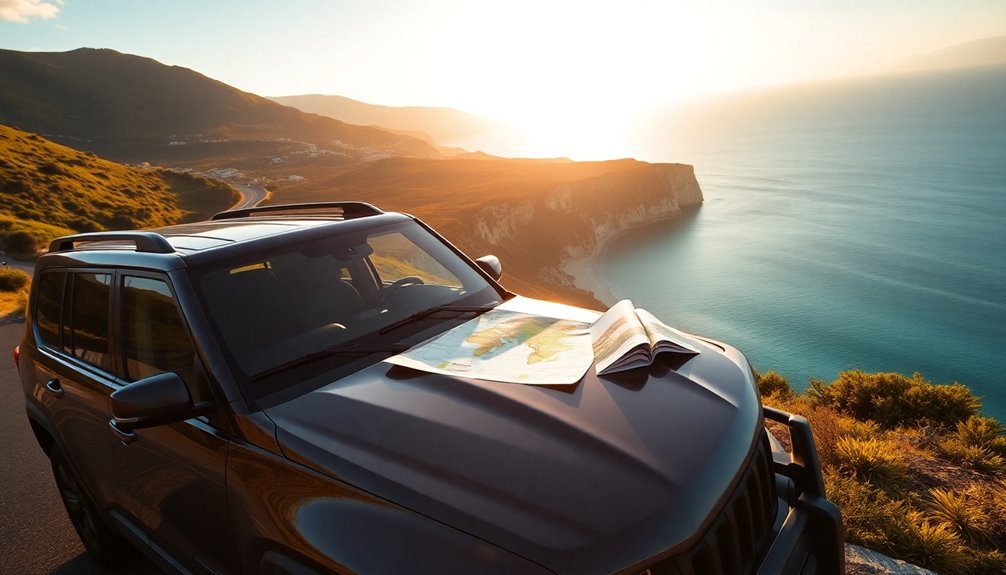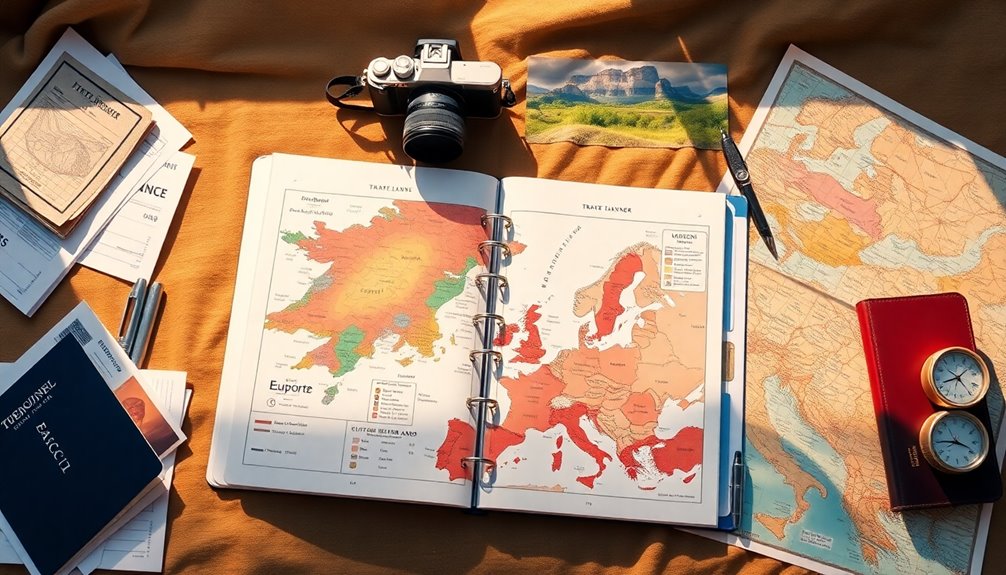Planning a European road trip? Start with a well-thought-out route and realistic time for each city, aiming for at least two full days. Choose a vehicle that fits your needs, considering comfort and fuel efficiency. Don’t forget essential documentation like insurance and a valid driving license. Budget wisely for accommodations and activities. Explore must-see attractions and make reservations in advance. There’s so much more to prepare for an epic adventure, so keep exploring your options! Additionally, it’s crucial to stay flexible and open to spontaneous detours, which can lead to unforgettable experiences. Are you well-prepared for any emergencies? If not, make sure to set aside funds in your road trip budget planning tips for unexpected expenses, such as roadside assistance or last-minute lodging. Finally, don’t forget to allocate some funds for local cuisine and souvenirs, as these can greatly enhance your travel experience.
Key Takeaways
- Plan your route with realistic time frames, allowing at least two full days in major cities for exploration.
- Choose a comfortable vehicle suited for your journey, prioritizing fuel efficiency and passenger space.
- Ensure all necessary documentation, including valid driving licenses and insurance, is in order for smooth travel.
- Budget for all expenses, including fuel, accommodations, and unexpected costs, to avoid financial surprises.
- Book attractions and accommodations in advance to secure your itinerary and save time during peak seasons.
Planning Your Route and Trip Length

When planning your route and trip length, it's essential to set a realistic time frame that allows you to fully enjoy each destination.
Consider allocating at least two full days per major city and three to four days for deeper exploration and day trips. Use Google Maps to visualize distances and calculate drive times, ensuring a balance between road time and exploration time.
Prioritize flexibility in your route to embrace unexpected adventures and avoid over-scheduling. Think about the number of countries you want to visit; adjust your road trip itineraries accordingly for a smooth travel pace.
Finally, build buffer time into your plans to accommodate delays, emphasizing the joy of the journey as much as the destinations you explore.
Choosing the Right Vehicle for Your Adventure

When you're picking a vehicle for your European road trip, think about comfort and space for both passengers and luggage.
The type of roads you'll be traveling on also matters; whether you're winding through city streets or cruising along scenic coasts, your choice should match the terrain.
Don't forget to take into account fuel efficiency and the local driving regulations to make your adventure smooth and enjoyable.
Vehicle Comfort Considerations
Choosing the right vehicle for your European road trip can greatly enhance your comfort and overall experience. Start by considering the number of passengers you'll have; a compact car is ideal for small groups and maneuvering narrow streets in historic towns.
Gas efficiency is another vital aspect, especially since fuel can cost around $7.50 per gallon in Germany. A vehicle with good gas mileage will help you manage expenses on long stretches.
Don't forget to check for a reliable air conditioning system to keep cool during summer temperatures that can reach up to 86°F. Additionally, make sure to pack home cinema essentials to enjoy movies during downtime at your accommodations.
Finally, familiarize yourself with local traffic laws and vehicle requirements, such as the need for winter tires in colder areas, to guarantee a smooth trip.
Luggage and Space Needs
Selecting the right vehicle for your European road trip hinges on your luggage and space needs. Consider how many passengers you'll have and the luggage they'll bring to guarantee comfort during your journey.
If you're maneuvering narrow streets, compact cars are perfect; they offer agility and ease of parking. However, if you're taking long trips with extra baggage, larger vehicles like SUVs are better, though they can be cumbersome in urban settings.
For those wanting to camp or sleep in the vehicle, a self-converted campervan provides essential amenities and flexibility.
Finally, prioritize fuel efficiency in your vehicle choice since gas prices can be steep, averaging around $7.50 per gallon in some areas. Additionally, understanding your luggage and space needs can significantly enhance your travel experience. Choose wisely for an unforgettable adventure!
Road Type Compatibility
As you plan your route through Europe, consider how the type of roads will influence your vehicle choice. For a scenic trip along the Cote d'Azur, a sporty convertible could enhance your experience.
If you're tackling the Alps in winter, a luxury SUV with ski racks and snow tires is crucial. Evaluate whether you'll be on main roads or narrow backroads; spacious cars work well on highways, while smaller, maneuverable vehicles are better for winding paths.
When renting a vehicle, prioritize reliability and fuel efficiency, especially for long distances—expect to pay around $75 daily in Germany. Additionally, consider vehicles with suspension tuning for improved handling on diverse road conditions.
Don't forget to familiarize yourself with local traffic laws, including requirements for car seats and tire types. These road trip tips will help guarantee a smooth adventure.
Insurance and Documentation Essentials

When planning your European road trip, securing the right insurance and documentation is essential to guarantee a smooth journey.
Start by obtaining thorough car insurance for your vehicle. If you're renting, consider additional coverage like breakdown insurance to ease potential worries.
Confirm you have a valid driving license, vehicle registration, and proof of insurance on hand. Depending on your destination, you might also need an International Driving Permit (IDP), so check the specific requirements for each country you'll be visiting.
Don't forget to verify visa requirements based on your nationality and travel itinerary.
Finally, make sure your passport is valid for at least six months beyond your planned return date to avoid any travel disruptions.
Accommodation Options and Booking Strategies

Finding the right accommodation can make or break your European road trip experience, so it's worth considering your options carefully. You can choose from various accommodation options, including mid-range hotel rooms, charming bed and breakfasts, or budget-conscious choices like hostels.
If you're traveling in a campervan, look for campervan sites that provide essential facilities like water and toilets. Booking accommodations in advance gives you peace of mind, especially during peak travel seasons, but don't shy away from spontaneous finds that can lead to unique experiences.
Keep in mind that popular attractions may require advance booking, so plan your route accordingly to enhance your adventure and enjoy a stress-free trip.
Budgeting for Your European Road Trip

When budgeting for your European road trip, it's essential to estimate your trip costs accurately.
Factor in expenses like fuel, accommodations, and daily spending, while also keeping a buffer for unexpected costs along the way.
This approach guarantees you're prepared for whatever your adventure throws at you.
Estimating Trip Costs
Estimating trip costs for your European road trip can feel overwhelming, but breaking it down into key categories makes it manageable.
Start with flights; roundtrip fares from NYC to Frankfurt average around $871, while LAX costs about $1,066.
For accommodations, budget about $185 per night for a mid-range hotel, or $102 for hostels.
Renting a car typically costs $75 daily, with gas prices reaching $7.50 per gallon in Munich.
For a 672-mile European road trip, expect to spend between $1,300 to $1,900 per person, covering meals, sightseeing, and souvenirs.
Planning to stay outside major cities can reveal hidden gems and help you save money, while still enjoying the best views Europe has to offer.
Managing Unexpected Expenses
Managing unexpected expenses during your European road trip is essential for a stress-free experience, so it's wise to establish a clear budget from the get-go.
Include all potential costs: fuel, tolls (about €10 every 100 kilometers), accommodation (campsites range from €15 to €35), food, attractions, and a buffer for surprises.
Use a budget calculator to keep your daily expenses realistic, factoring in gas prices and car rental rates. Booking accommodations in advance can prevent last-minute price hikes, especially during peak seasons.
Additionally, research local customs that might affect your costs. By planning for unexpected expenses, you'll enjoy a more flexible and memorable adventure. Creating a personal budget can help ensure you're prepared for anything that comes your way!
This Trip Guide will help guarantee you're prepared for anything that comes your way!
Must-See Attractions and Booking Tips

To make the most of your European road trip, prioritizing must-see attractions in each destination is vital. Start by researching the best things to see, like the Eiffel Tower in Paris or the Colosseum in Rome, and incorporate them into your road trip itinerary.
Booking tips are important; reserve activities and popular attractions in advance, especially during peak season. Skip-the-line tickets can save you valuable time to explore.
Don't forget to check local customs, as some sites have specific dress codes or entry requirements. Utilize online resources and travel guides to compare options and look for discounts or package deals.
With these strategies, you'll guarantee that every stop on your journey is truly worth a visit.
Navigating Ferries and Transportation Options

While planning your European road trip, managing ferries and transportation options can greatly enhance your journey. Ferries are vital for connecting countries and coastal regions, so consider routes that align with your itinerary, like those between Italy and Greece or the UK and mainland Europe.
Booking ferries in advance is significant, especially during peak season—ideally, a couple of weeks ahead. This not only saves money but also guarantees availability.
Don't forget to check vehicle requirements, as different operators have varying policies regarding car sizes and types. Many ferry services offer great onboard amenities, making your travel experience even more enjoyable.
Frequently Asked Questions
How Many Days Is Enough for a Europe Trip?
For a satisfying Europe trip, aim for at least two weeks.
This gives you enough time to explore major cities and immerse yourself in local cultures without feeling rushed. Spend three days in key cities like Rome or Paris, allowing you to visit attractions and enjoy the atmosphere.
Limit your itinerary to three or four countries to keep things manageable and flexible, making your adventure both enjoyable and memorable.
How to Plan a European Road Trip?
To plan a European road trip, start by defining your main goal, whether it's scenic views or cultural experiences.
Set a budget that covers fuel, tolls, accommodations, and food.
Map out your route, pinpointing key towns and estimating how long you'll stay in each.
Choose the right vehicle for your needs, book accommodations in advance, and make sure all necessary documents are ready.
Don't forget to take into account communication options to stay connected while traveling!
Which Country in Europe Is Best for a Road Trip?
When considering which country in Europe is best for a road trip, it's tempting to say it's Italy due to its stunning landscapes and rich history.
However, each country offers unique experiences. If you crave coastal views, Portugal's Algarve shines. For cultural immersion, France's Loire Valley is unbeatable.
Ultimately, it depends on what you seek—scenic routes, historic towns, or culinary delights. Explore, and you'll find your perfect road trip destination!
How Do I Organize My Trip Around Europe?
To organize your trip around Europe, start by defining your main goals, whether it's scenic views or cultural experiences.
Use Google Maps to plot your desired destinations, calculating drive times to find a good balance.
Keep your itinerary flexible for spontaneous adventures, and research accommodations that suit your needs.
Finally, familiarize yourself with local traffic laws and make certain you have the proper documentation, like an International Driving Permit, for a smooth journey.
Conclusion
As you commence your European road trip, remember to embrace the journey as much as the destination. Picture yourself cruising along the Amalfi Coast, the sun setting over the Mediterranean, with the wind in your hair and your favorite playlist blasting. By planning your route, choosing the right vehicle, and budgeting wisely, you'll create memories that last a lifetime. So, pack your bags, hit the road, and let the adventure unfold!








